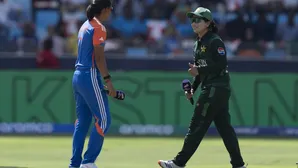
Cricket’s fiercest rivalry takes center stage once again as India and Pakistan women face off on October 5 in Colombo in the ongoing ICC Women’s World Cup. The build-up to this match has been charged — not just because of the contest itself, but due to looming rain and off-field politics that have intensified the atmosphere.
Forecasts for Colombo paint a grim picture. Continuous rain and heavy cloud cover threaten to disrupt the match, raising fears of another washout after Sri Lanka and Australia’s game was abandoned without a ball bowled the previous day. With damp conditions and unpredictable showers, both teams may have to contend with a shortened encounter or, worse, share points if the weather refuses to cooperate. For players, preparation is already a mental battle — planning for a full 50-over contest but staying ready for sudden interruptions.
On paper, India remain heavy favourites. They’ve never lost an ODI to Pakistan in women’s cricket — an 11-0 record that highlights their dominance in the format. Their recent win against Sri Lanka via the DLS method shows form and adaptability, something that could prove vital again if the weather interferes. Pakistan, on the other hand, come into the clash bruised from a loss to Bangladesh. For them, this game is more than just points — it’s about pride and redemption. Conditions in Colombo, with low bounce and moisture, could work in their favour, particularly for their spinners who might extract early grip.
But beyond the pitch, tensions are escalating for another reason — the ongoing “handshake controversy.” After the Indian men’s team repeatedly avoided post-match handshakes with Pakistani players and even skipped receiving a trophy from a Pakistani official during the Asia Cup, speculation grew about whether the Indian women’s side would follow suit.
The BCCI has hinted that the “no-handshake” protocol might remain in place, citing the unchanged diplomatic relationship between the two countries. A senior BCCI official remarked that the women’s team “will be aligned with the men’s approach,” implying there may be no handshakes before or after the match. Such a move, while symbolic, underscores how deeply politics has seeped into sport in recent months.
Players themselves have largely stayed away from the debate. All-rounder Deepti Sharma maintained that the team’s focus is “purely on cricket” and that they are “not distracted by what happens beyond the boundary.” Still, for global audiences, the optics of an India–Pakistan match without a handshake carry weight far beyond cricketing significance.
With rain clouds overhead and diplomatic frost on the ground, the stage is set for a contest where every moment — whether on or off the field — will be scrutinized. The question is no longer just who will win the match, but whether the game will rise above the storm — both meteorological and political. Whatever happens, October 5 in Colombo will be remembered as another chapter in the most emotionally charged rivalry in world cricket.
12BET Shortlisted for Sportsbook Operator of the Year at SBC Awards 2025

